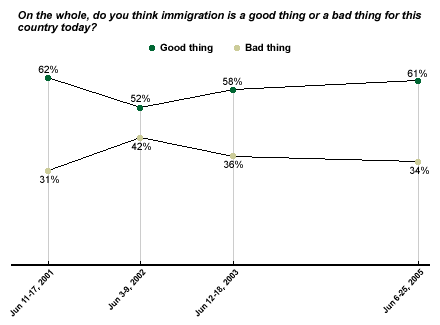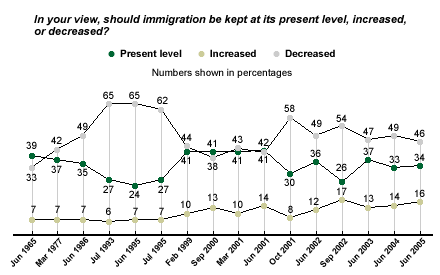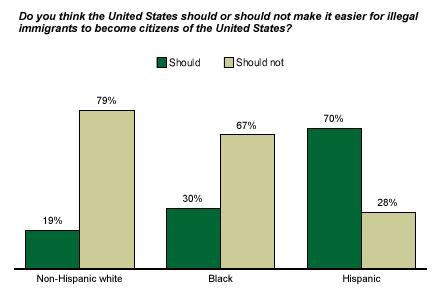President Bush traveled to Texas and Arizona last week to push new strategies for dealing with an issue that has divided the public and even his own party: immigration. His recent proposal on immigration reform hinges on hardened border security, a commitment to returning illegal immigrants to the interior of Mexico, and a controversial temporary worker program that allows illegal immigrants to get temporary legal status for a fixed period. Bush needs to gain political traction on this issue; a Nov. 11-13 Gallup Poll* shows that just 26% of Americans approve of the way he is handling immigration, while 65% disapprove.
Is Immigration Good or Bad for the U.S.?
For Americans, the problem doesn't appear to be the notion of immigration per se -- a majority still views it as a good thing. Gallup's annual survey on minority relations, conducted last June**, found a majority of Americans (61%) saying they consider immigration a good thing for this country today. Slightly more than a third (34%) said it is a bad thing for the country. A majority of Americans have viewed immigration as a good thing since Gallup began asking this version of the question in 2001.

Nevertheless, when asked in the same survey about the level of immigration into the United States, Americans were more likely to favor decreasing it than increasing it. A plurality -- 46% -- said they would like to see immigration decreased, 34% want to see it kept at its present level, and just 16% would like to see it increased.

Economic Interests Pervade Immigration Issue
The apparent contradiction may reflect Americans' ambivalence about the specific economic and social effects of immigration. The public is divided on whether immigrants mostly help or mostly hurt the economy. Forty-two percent believe immigrants help the economy by providing low-cost labor, while 49% think immigrants hurt it by driving down wages. There are differences of opinion by race and ethnicity. A majority of Hispanic Americans say immigrants mostly help the economy, while majorities of non-Hispanic white Americans and black Americans say immigrants mostly hurt the economy.
Americans are also divided on whether immigrants become productive citizens in the long run and pay their fair share of taxes, or cost the taxpayers too much by using government services such as public education and medical services. Forty-nine percent say immigrants pay their fair share, while 44% say they cost taxpayers too much. Non-Hispanic whites and blacks are fairly divided on this question, but two-thirds of Hispanics say immigrants pay their fair share.
Citizenship
The June survey also asked respondents whether they think it should be made easier for illegal immigrants to become citizens. Only 28% of Americans believe is should be made easier, while 70% disagree. Hispanic respondents are much more likely than non-Hispanic whites or blacks to think the United States should make it easier for illegal immigrants to become citizens. Seven in 10 Hispanics Americans think that it should be easier, compared with 30% of blacks and just 19% of non-Hispanic whites.

*These results are based on telephone interviews with a randomly selected national sample of 1,006 adults, aged 18 and older, conducted Nov. 11-13, 2005. For results based on this sample, one can say with 95% confidence that the maximum error attributable to sampling and other random effects is ±3 percentage points. In addition to sampling error, question wording and practical difficulties in conducting surveys can introduce error or bias into the findings of public opinion polls.
**Results are based on telephone interviews with 2,264 national adults, aged 18 and older, conducted June 6-25, 2005, including oversamples of blacks and Hispanics that are weighted to reflect their proportions in the general population. For results based on the total sample of national adults, one can say with 95% confidence that the maximum margin of sampling error is ±5 percentage points.
